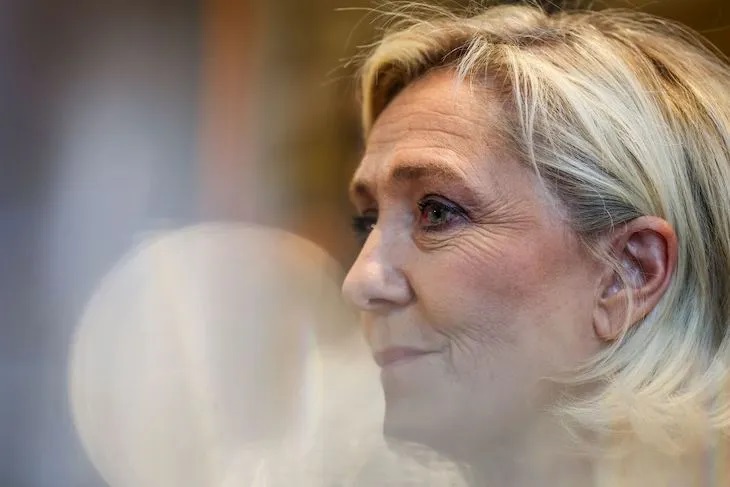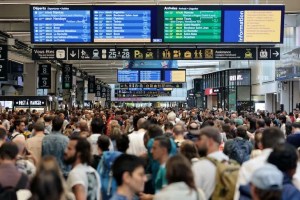Yesterday evening French television broadcast a live debate between prime minister Gabriel Attal and Jordan Bardella. The president of the National Rally is on course for a spectacular victory in the European elections on June 9, but Emmanuel Macron has hopes that his Boy Wonder might be able to close the gap with a strong performance.
One of Attal’s few lines of attack will be Russia
When Macron nominated Attal his PM in January, he was dubbed the “anti-Bardella” choice. His predecessor, the eye-wateringly dull Elisabeth Borne, had by her age and socialist bent, enabled the twenty-eight-year-old Bardella to cultivate an image of the coming man, appealing to the youth and older conservative voters. Attal is only seven years Bardella’s senior and has more robust views on law and order than Borne.
One of Attal’s few lines of attack will be Russia, and the National Rally’s soft spot for Vladimir Putin in the decade before he invaded Ukraine.
That’s not the only dubious acquaintance Attal will bring up this evening. No doubt he will reference Maximilian Krah, who is the main candidate for Alternative for Germany, or AfD, in the European elections. For the last five years, the AfD and the National Rally have been allies in the European Parliamentary Group, Identity and Democracy, or I&D.
In a weekend interview with an Italian newspaper, Krah said that the SS “were not all criminals.” He continued: “It depends. You have to assess blame individually… Before I declare someone a criminal, I want to know what he did.”
The SS was paramilitary force of Adolf Hitler’s Nazi Party; it committed war crimes on a colossal scale, not just against six million Jews, but against civilians across Europe and also against enemy combatants. In May 1940, an SS unit murdered eighty-one British PoWs in Northern France, just one of numerous atrocities perpetrated against Allied soldiers.
Krah has since claimed his comments were taken out of context, but on Wednesday he resigned from the senior leadership team of the AfD with immediate effect.
Le Pen’s father, Jean-Marie, who founded the party in 1972, was convicted of Holocaust revisionism on several occasions and one of his political cohorts in the early days had fought for the French Division of the SS. Le Pen replaced her dad as party leader in 2011 and has striven to cleanse the National Rally of its past, but World War Two remains a sensitive subject.
Le Pen moved swiftly to sever ties with the AfD, a party with whom relations had become increasingly strained in recent months. Le Pen denounced the AfD’s proposition earlier in the year to deport German citizens with a migrant background; last month she angrily told the AfD to “stick to German affairs” when they said France should return its overseas department of Mayotte to the Comoros.
In a radio interview on Wednesday, Le Pen said it’s “just one provocation after another” with the AfD. She added: “It’s no longer time to just distance oneself, it’s time to enact the rupture with this movement that has no direction and is at the whim of radical groups within.”
Even before Krah’s comments, there was speculation that Le Pen was plotting to unhitch herself from the AfD. On Sunday, she was at a conference in Madrid as a guest of the Spanish party, Vox, as was the Italian PM Giorgia Meloni. Vox and Meloni’s Fratelli d’Italia Party belong to the European parliamentary group, the European, Conservatives and Reformists, or ECR, as does Éric Zemmour’s Reconquest. Le Pen’s I&D counts among its members the Freedom Party of Austria, Geert Wilders’s Dutch PVV and Matteo Salvini’s (who is Meloni’s deputy PM) Lega.
Germany’s weak and inept leadership has angered and embittered voters across the bloc
Although there are differences — for example, the I&D would like a peace settlement in Ukraine while the ECR is unstinting in its support of Ukraine — both groups are united by a fierce determination to reshape the EU.
Le Pen’s address was acclaimed by the audience, who appreciated her declaration that “the real Europe, the Europe of freedom and people, the Europe of sovereignty and states, the Europe of identity and nations, needs our combined forces.”
This was also the message from Meloni. “I want to try — a difficult but intriguing task — to reproduce in Europe what has been done in Italy: uniting parties that are compatible in their vision even though there are nuanced differences,” she told a television interviewer.
Achieve that coalition, Meloni said, and it would be possible “to build a different majority from the one we have had for the last five years, which is an unnatural majority between the European People’s Party and the socialists.”
The figurehead of the centrist European People’s Party is the EU Commission president, Ursula von der Leyen, a woman reviled by Le Pen. The antipathy is mutual and von der Leyen has said that, while she could see herself working with Meloni’s ECR, she would never collaborate with Le Pen’s I&D
In recent months, Meloni has been accused of cozying up to von der Leyen but her remarks on Sunday suggest that the Italian PM may have been stringing the German along.
Another guest on Sunday’s conference in Madrid was the Hungarian prime minister, Viktor Orbán, the nemesis of von der Leyen. His Fidesz Party quit the European People’s Party in 2021 and has since been independent within the EU Parliament. Orbán’s influence will be crucial to any potential alliance between Le Pen and Meloni.
Orbán’s pinned tweet on the social media platform is a video montage of his meeting several European politicians, among them Meloni, Le Pen and Wilders. “National conservative, sovereignist and Christian forces are on the rise all across Europe,” declares the Hungarian prime minister. “We don’t represent progressive ideas, we represent the people.”
Germany has dominated the EU since its inception, and their weak and inept leadership has angered and embittered voters across the bloc. Their mistakes are many: the treatment of Greece, its energy policy, its naivety towards Putin, its neglect of defense spending and its unilateral decision to open the continent’s borders in 2015.
Orbán’s stated aim is to “Make Europe Great Again,” an ambition shared by Meloni and Le Pen. They think that Germany has had its day and that its politicians, whatever their shade, are nothing but trouble. For them, the elections on June 9 are about launching a new Europe, one that doesn’t include Germans.
This article was originally published on The Spectator’s UK website.





















